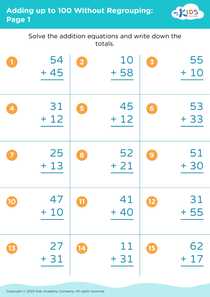Fine Motor Skills Grade 2 Adding up to 100 with Regrouping Worksheets
3 filtered results
-
From - To
Enhance your second-grade classroom with our "Fine Motor Skills Grade 2 Adding up to 100 with Regrouping Worksheets." Designed to boost both mathematical understanding and fine motor abilities, these engaging worksheets provide students with the opportunity to practice addition through regrouping. As children complete the worksheets, they will strengthen their hand-eye coordination and pencil control while mastering addition concepts up to 100. Our resources support differentiated learning, catering to various skill levels and ensuring a fun learning experience. Perfect for reinforcing classroom lessons or offering additional practice at home, these worksheets make math interactive and enjoyable for young learners!
Parents and teachers should prioritize fine motor skills development in Grade 2, particularly in the context of math concepts like adding up to 100 with regrouping. Fine motor skills involve the coordinated use of small muscles in the hands and fingers, enabling children to perform tasks that require precision, such as writing, drawing, and manipulating objects—integral skills for academic success.
When children master fine motor skills, their ability to write numbers legibly, organize their work, and perform calculations improves. In math, regrouping requires a nuanced understanding of numbers and the ability to align and manipulate them correctly. Fine motor skills allow students to physically manage the numbers they are working with, whether it’s using manipulatives, drawing out problems, or writing equations accurately.
Moreover, enhancing fine motor skills builds confidence in young learners. As children become more adept at completing math problems, they develop a positive association with challenging tasks, encouraging perseverance and a love for learning. Teachers and parents focusing on these skills can help set the foundation for higher-level math and writing abilities, essential for academic progression. Thus, investing time in developing fine motor skills plays a crucial role in shaping both the cognitive and emotional resilience of children.

















